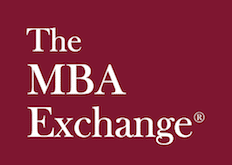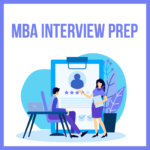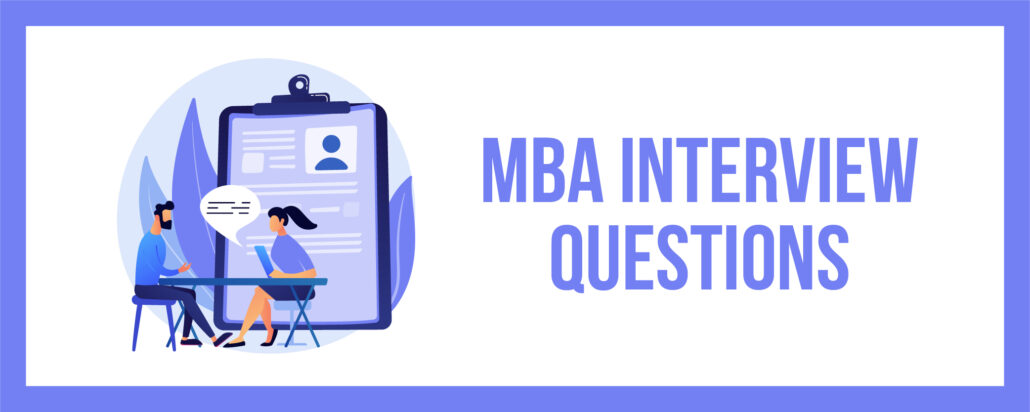
Cracking the code to the MBA interview is one of the most important parts of the admissions process.
The MBA interview question portion is important for both the interviewer and the MBA candidates.
First, it provides an opportunity for the admissions committee to evaluate your interpersonal skills, motivation, and overall fit with the program.
Second, interviews allow you to showcase your strengths and accomplishments beyond what can be conveyed in a written application.
Now, you might be wondering, how do I set myself apart from the crowd and land that coveted MBA spot? Or maybe you’re asking yourself what it takes to ace the MBA interview?
If these thoughts have ever crossed your mind, you’re in the right place! Let us help you navigate the high-stakes world of MBA interviews, where every answer can make or break your chance to enter your dream business school.
Keep reading, and we’ll dive into the most common MBA interview questions, insider advice, and proven strategies for success. So, are you ready to take the first step toward your future in the business world?
MBA Interview: What To Expect
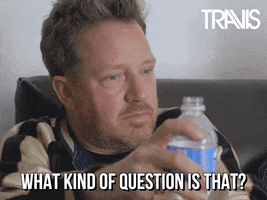
As you walk into the interview room, your heart is racing. You have been preparing for this moment for weeks, studying up on the school’s values, researching the program’s unique offerings, and rehearsing your answers to common MBA interview questions.
As you sit down across from the interviewer, you try to calm your nerves and present the confident, articulate version of yourself that you know you can be. The interviewer begins by asking you to walk them through your resume, and you launch into your carefully crafted narrative of your professional and academic achievements.
You discuss your future goals, reasons for pursuing an MBA, and how the program aligns with your aspirations. The interviewer also asks you some unexpected questions, testing your ability to think on your feet and respond to challenges.
As the interview comes to a close, you feel a mix of relief and anticipation – you have done your best, but now it is out of your hands. All you can do is wait and hope that your performance has been enough to earn you a spot in the program.
As you can see from this narrative, one of the most critical parts of an MBA interview is answering questions fielded by admissions officers. This can also be one of the biggest challenge areas, but it doesn’t have to be. Crafting a solid answer for common MBA interview questions is one way to ensure you’re prepared.
Common MBA Interview Questions
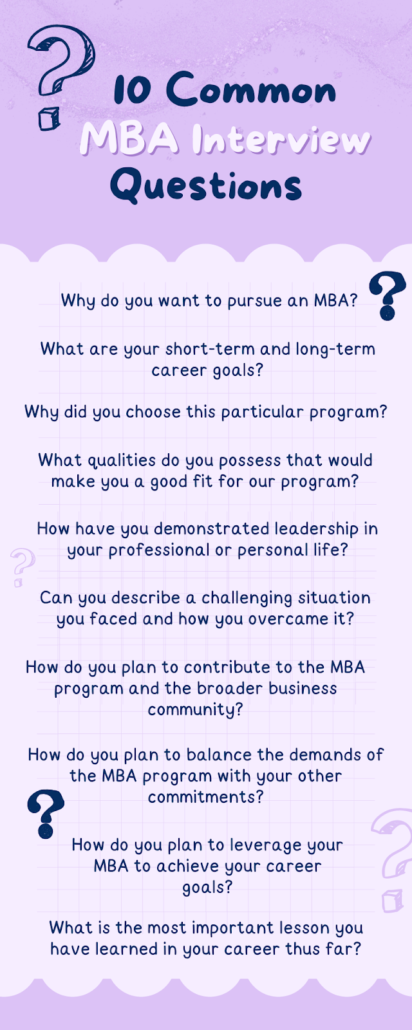
Let’s kick things off with common MBA interview questions. Now, don’t go thinking these are a walk in the park. Yes, they may be common, but that doesn’t mean they’re easy to navigate.
Some of these may include:
- “Why did you choose our MBA program?”
- “How will an MBA from our business school help you achieve your career goals?”
- “What are your post-MBA objectives?”
- Tell us about a time when you demonstrated leadership skills.”
- “Describe a challenging experience at your current job and how you handled it.”
- “What’s your biggest weakness, and what are you doing to address it?”
Understanding these common MBA interview questions and preparing solid answers can increase your chances of acing the interview.
Situational MBA Interview Questions
In the business world, one thing is certain: unexpected situations arise all the time. MBA interviews often include situational questions designed to assess your ability to navigate these scenarios. These questions help the admissions committees of MBA programs understand your problem-solving skills, leadership style, and how you’d respond under pressure. Here are some examples:
How would you handle a team member who’s not pulling their own weight?
When faced with this question, the interviewers are looking to assess your leadership skills and conflict resolution abilities. Discuss a time when you successfully managed a similar situation. Highlight your ability to communicate openly, encourage teamwork, and maintain a productive team environment.
Describe a time when you had to make a difficult decision that resulted in positive results.
Here, the admissions committee wants to gauge your decision-making skills and your ability to steer toward positive results, even when the situation is challenging. Bring to light a situation where you made a tough call that eventually led to success. Be sure to explain your thought process and the steps you took to arrive at the decision.
What would you do if you didn’t meet a quarterly sales increase target?
This question tests your problem-solving skills and how you handle setbacks. You could discuss a strategy that involves analyzing what went wrong, brainstorming solutions, and implementing a revised plan. Make sure to demonstrate a positive attitude and a commitment to continuous improvement.
If you had to change careers tomorrow, how would you approach this major shift?
This question tests your adaptability and strategic thinking. A potential response could be: “I’d start by identifying my transferable skills and researching the new industry. Then, I’d create a strategic plan to gain necessary skills, network, and transition smoothly.”
What strategy would you use to solve a pressing issue confronting today’s business world?
This question gauges your problem-solving skills and awareness of business trends. A possible answer might be: “I’d first understand the issue thoroughly, then bring together a diverse team to brainstorm solutions. We’d then design and implement a strategy, considering factors such as feasibility, cost, and potential impact.”
Personal Questions
The admissions committee wants to know you beyond your professional experience. Expect personal questions about your undergraduate education, personal life, and past experiences. Remember, the goal here is to assess your personality and how well you’ll fit into the school culture.
Here are a few examples of personal questions that could be asked during an MBA interview, along with some tips on how to respond to them:
What are your short-term and long-term career goals?
This question allows the interviewer to understand your ambitions and how the MBA program aligns with your plans. For example, a potential response could be: “In the short term, I aim to secure a role in product management at a leading tech company. In the long-term, I plan to leverage my MBA degree and experience to establish my own venture in the technology sector, contributing to digital innovation and creating job opportunities.”
How do you handle conflicts or challenging situations?
The interviewer wants to gauge your interpersonal and problem-solving skills. You might say: “I approach conflicts by first trying to understand the other party’s perspective. Then, I focus on finding common ground and collaborating on a mutually beneficial solution. I believe in open communication and active listening to resolve issues effectively.”
Tell us about a time when you demonstrated leadership skills.
This question tests your ability to lead and inspire others. A possible response could be: “During my recent job, I led a cross-functional team to develop a new software product. I fostered a collaborative environment, clearly defined roles, and provided support when needed. As a result, we delivered the product ahead of schedule and received positive feedback from the client.”
Can you describe a situation where you had to work in a team, and how did you contribute?
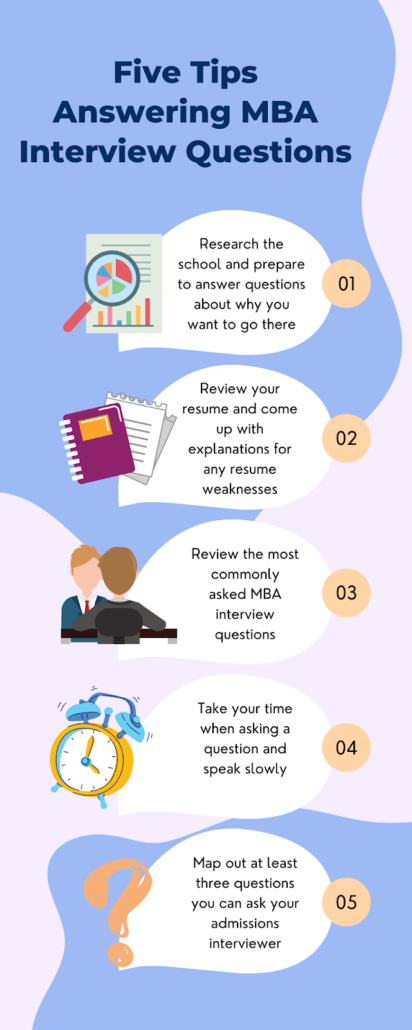
This question assesses your teamwork abilities and how well you collaborate with others. An example answer might be: “In my previous role, I was part of a project team tasked with launching a new marketing campaign. I actively participated in brainstorming sessions, shared my expertise in digital marketing, and took responsibility for creating the social media strategy. Our collaborative efforts led to a successful campaign that exceeded targets.”
How have you demonstrated a commitment to diversity and inclusion through work or extracurricular activities?
The interviewer is interested in understanding your values and how you promote a diverse and inclusive environment. A potential response could be: “At my previous job, I noticed a lack of diversity in the marketing department. I proposed and helped organize a series of workshops on cultural sensitivity and unconscious bias. These workshops encouraged open dialogues and helped foster a more inclusive work environment.”
You could also craft a response related to diversity through extracurricular activities.
When responding to personal questions in an MBA interview, remember to be genuine and focused and relate your answers to your overall MBA goals and aspirations.
Technical Questions
While you don’t need to be a master of all trades, having some technical knowledge about your chosen specialization (like digital marketing or business administration) can give you an edge in the MBA interview.
Demonstrating a solid understanding of relevant concepts and industry trends can showcase your expertise and commitment to your career goals. Here are a few examples of technical questions that could be asked during an MBA interview, along with some suggestions on how to respond:
Digital Marketing: “How would you develop an effective content marketing strategy?”
A potential response could be: “An effective content marketing strategy starts with defining clear objectives and identifying the target audience. It’s crucial to conduct thorough research on audience preferences, competitors, and industry trends. Based on these insights, I would create a content calendar with a mix of engaging and informative content optimized for SEO and tailored for various platforms. Performance metrics should be consistently monitored and analyzed to refine the strategy over time.”
Finance: “Can you explain the concept of discounted cash flow and its importance in business valuation?”
A possible answer might be: “Discounted cash flow (DCF) is a financial valuation method that estimates the value of an investment based on its future cash flows, discounted back to their present value. This approach takes into account the time value of money, reflecting the idea that a dollar today is worth more than a dollar in the future. DCF is widely used in investment decisions, mergers and acquisitions, and business valuations, as it helps determine the fair value of an asset or company.”
Business Analytics: “How can businesses leverage big data to drive better decision-making?”
A potential response could be: “Businesses can leverage big data by using advanced analytical tools and techniques to process and analyze vast amounts of structured and unstructured data. This analysis can reveal hidden patterns, trends, and insights that inform strategic decision-making, improve operational efficiency, and drive innovation. For example, predictive analytics can help forecast customer behavior, while prescriptive analytics can recommend optimal actions to achieve specific business objectives.”
Operations Management: “What is the role of Six Sigma in improving business processes?”

An example answer might be: “Six Sigma is a data-driven, problem-solving methodology aimed at reducing defects and process variability in order to enhance product quality and customer satisfaction. By identifying and eliminating the root causes of errors or inefficiencies, Six Sigma enables organizations to streamline their operations, reduce costs, and ultimately improve their bottom line.”
Human Resources: “How can organizations create a positive work culture that attracts and retains top talent?”
A possible response could be: “Organizations can create a positive work culture by fostering open communication, promoting diversity and inclusion, offering competitive compensation and benefits, and providing opportunities for growth and development. Employee engagement initiatives, regular feedback, and recognition of accomplishments can also contribute to a supportive work environment that attracts and retains top talent.”
When responding to technical questions in an MBA interview, make sure to showcase your knowledge and understanding of relevant concepts and their practical applications. Relating your answers to real-world scenarios and recent industry developments can further demonstrate your expertise and passion for your chosen field.
Answering MBA Interview Questions: Strategies for Success
Use Specific Examples
When answering MBA interview questions, it’s crucial to give concrete examples. Instead of saying, “I have strong communication skills,” demonstrate your prowess by saying, “In my recent job as a marketing manager, I led a team of five members and effectively communicated our marketing materials across multiple channels, resulting in a 30% increase in quarterly sales.”
Be Honest
It’s important to be honest when answering MBA interview questions. If you don’t know the answer to a question, admit it and mention your willingness to learn. If the question is about a weakness or a challenging experience, avoid sugarcoating the situation. Instead, focus on how you’re working to improve or what you learned from the experience.
Show Self-Awareness
Admissions committees appreciate candidates who are self-aware. Reflect on your strengths and weaknesses, and be prepared to discuss them in the MBA interview. This will demonstrate your ability to grow and adapt in today’s ever-changing business environment.
Practice Active Listening
Active listening is an essential skill in any interview, including MBA interviews. Pay attention to the interviewer’s questions, and if needed, ask for clarification before answering. This shows that you’re engaged in the conversation and eager to understand the question fully.
Showcase Your Leadership Skills
Leadership is a key component of an MBA program. When answering MBA interview questions, highlight your leadership experience, whether it’s from your professional or personal life. Discuss times when you led a team, overcame a major obstacle, or achieved positive results through successful management.
Preparing for the MBA Interview
Now that you have a sense of the MBA interview questions let’s move on to how you can prepare for them.
Understand the MBA Program
Thorough research about the MBA program you’re applying to is a must. Look into the school or program’s values, course structure, job placement opportunities, and industry connections. This information will help you tailor your answers and show that you’re serious about the MBA program.
Reflect on Your Academic and Professional Experience
Your academic and professional experience is a goldmine of examples you can use to answer MBA interview questions. Reflect on your past roles, major obstacles you’ve overcome, your biggest achievements, and times when you demonstrated leadership.
Develop Key Talking Points
Having a set of key talking points can help you maintain focus during the MBA interview. These could be about your career path, post-MBA objectives, unique aspects of your professional experience, or interesting facts about your personal life.
Turning the Tables: Questions to Ask in Your MBA Interview
You’ve tackled every tough MBA interview question, demonstrated your leadership skills, and showcased your knowledge of the business world. But remember, an MBA interview is a two-way street. While it’s important to answer questions effectively, it’s equally critical to ask insightful questions. This not only shows your genuine interest in the MBA program but also helps you evaluate if the business school aligns with your career goals and personal preferences. Here are some thoughtful questions to ask in your MBA interview:
Can you share more about the school culture and how it supports students’ growth?
This question will help you understand the school’s environment and how well you could fit in. It’s important to choose a school culture that aligns with your values and learning style.
What type of career services does the school offer?
Asking about career services can give you insights into the school’s connections in the business world and its dedication to student job placement. You might also ask about the school’s recent job placement statistics.
How does the school’s curriculum stay updated with the current trends in the business world?
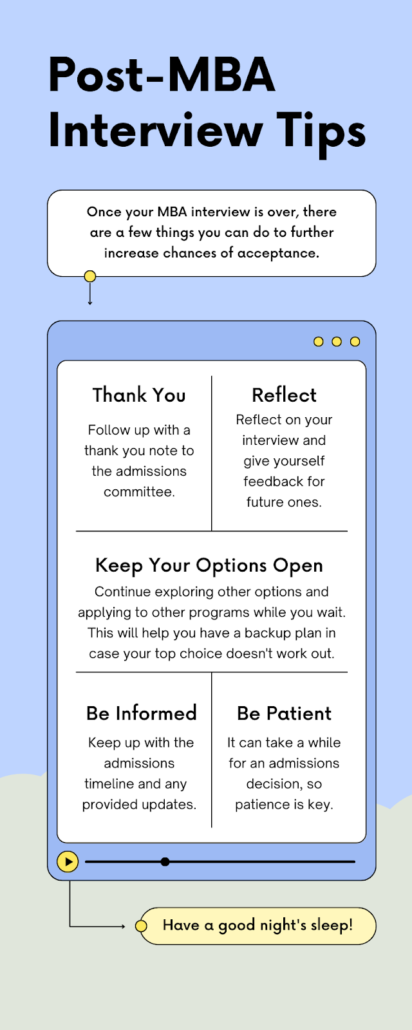
This question shows that you’re keen on learning relevant skills that will prepare you for the future business landscape.
Could you describe the student community and opportunities for networking?
Getting a sense of the student community and networking opportunities can indicate if the school can provide valuable industry connections.
How does the school support students in achieving their post-MBA objectives?
This question not only displays your forward-thinking approach but also helps you understand how the school supports its students in reaching their career goals.
What unique aspects of this particular program make it stand out from other schools?
This question can provide you with information that might not be available in the marketing materials of the school or program, and it shows your interest in the school’s unique offerings.
Remember, there’s no one-size-fits-all when it comes to the MBA interview. Tailor these questions based on your research about the school and your individual needs. Your questions should reflect your thorough research and genuine interest in the school, setting you apart as an informed and engaged candidate.
Post-Interview: What’s Next?
Once you’ve given your interview questions and answers, the wait begins. Part of pursuing a master’s degree and your first job in connection with your future school can be to do the following.
Follow Up with a Thank You Note
After your MBA interview, it’s good etiquette to send a thank-you note to the interviewer or the admissions committee. This not only shows your appreciation for their time but also keeps you fresh in their minds during the admission process.
Reflect on the Interview
Take some time to review the MBA interview questions you were asked and your responses. This will help you identify areas for improvement and better prepare for future interviews or other schools’ admissions processes.
Be Patient
The admissions process for business schools can be lengthy. While waiting for a decision, continue working on your current job, stay updated on the business world, and keep honing your skills.
Securing Success: Ways to Get Help for Your MBA Interview
Preparing for an MBA interview can be an overwhelming process. But don’t worry—you don’t have to go through it alone! Here are some ways to get help and support to ensure you’re putting your best foot forward during your MBA interview:
MBA Admissions Consultants
MBA admissions consultants are professionals who specialize in helping applicants navigate the business school application process, including MBA interviews. They have extensive knowledge of MBA programs, admissions criteria, and interview strategies. Working with a top MBA admissions consultant can provide you with personalized guidance, expert feedback, and valuable insider advice. They can also conduct mock interviews to help you practice and refine your interview skills.
Business School Resources
Many business schools offer interview preparation resources on their websites, such as sample interview questions and tips. Additionally, some schools host webinars or workshops on interview preparation, which can provide you with practical advice and guidance straight from the source.
Online Forums and Communities
There are numerous online forums and communities dedicated to MBA programs where current students, alumni, and applicants share their experiences and insights. These platforms can be an excellent source of advice, as well as a place to find practice partners for mock interviews.
Networking with Alumni and Current Students
Reaching out to alumni or current students from your target business school can be an invaluable way to gain insider information about the school’s interview process. They can share their experiences and offer advice on what to expect, which can help you better prepare for your interview.
Career Services at Your Undergraduate Institution
Your undergraduate institution’s career services office may offer resources and support for interview preparation, including MBA interviews. They can provide guidance on interview strategies, conduct mock interviews, and offer feedback on your performance.
By exploring these resources and seeking help from MBA admissions consultants, you can better prepare yourself for the MBA interview process and increase your chances of securing a spot at your dream business school.
Compare MBA admissions consultants
Conclusion
Mastering the MBA interview questions is a crucial step in securing a spot in your desired business school. By understanding the types of questions to expect, preparing thoroughly, and following the strategies for success, you’ll increase your chances of acing the interview and pursuing your graduate business degree.
FAQs fo MBA Interviews
You can expect common MBA interview questions, situational questions, personal questions, and technical questions.
Research the MBA program, reflect on your academic and professional experience, and develop key talking points for your graduate business degree interview.
Use specific examples, be honest, show self-awareness, practice active listening, and showcase your leadership skills.
Send a thank-you note, reflect on the interview, and be patient during the admissions process.
The MBA interview is a critical component of the admissions process, as it allows the admissions committee to assess your fit for the program and your potential to thrive in the business world.
Discuss your leadership experiences from your professional or personal life, focusing on examples of leading a team, overcoming obstacles, or achieving positive results through successful management.
MBA interviews focus more on your fit for a specific MBA program and business school. They assess your career goals, motivation for an MBA degree, and how the school can help you reach those goals. Preparation involves researching the MBA program and reflecting on your experiences.
To stand out, showcase your unique qualities and skills that align with the business school. Use specific examples to highlight achievements, display self-awareness, and demonstrate how the MBA program aligns with your career goals. Also, ask thoughtful questions about the school.
Avoid generic responses, not providing concrete examples, lacking self-awareness, and failing to show how the MBA program fits your career goals. Be specific, honest, and self-aware in your responses.
Professional attire is recommended for an MBA interview. This includes a suit and tie for men and a suit, dress, or skirt and blouse for women. Choose conservative colors to present a polished and professional image.
Business schools often provide sample interview questions on their websites. Online forums and websites dedicated to MBA programs also offer valuable insights. MBA admissions consultants can offer personalized guidance and mock interviews.
Prepping for an MBA interview requires all of the usual graduate school admission interview preparation. One of the main steps that you shouldn’t skimp on is making sure that you are prepared to ask and answer questions from the admissions committee. These range from questions like “What makes you a good fit for our program,” to personal questions like “What weakness would you need to mitigate before being accepted?”
If you feel like you didn’t perform well during your MBA interview and didn’t answer the questions as well as you could have, don’t panic. You should take a deep breath, assess what went wrong, and reach out to the admissions committee. Consider sending a follow-up email to the admissions committee thanking them for their time and expressing your continued interest in the program. You can also use this opportunity to address any questions you may have answered poorly or clarify any misunderstandings.
Bryce Welker is an active speaker, blogger, and regular contributor to Forbes, Inc.com, and Business.com where he shares his knowledge to help others boost their careers. Bryce is the founder of more than 20 test prep websites that help students and professionals pass their certification exams.





